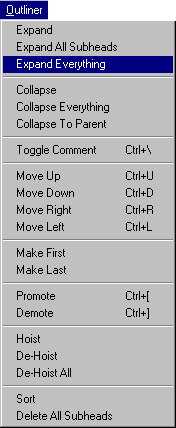Welcome to Outliners.Com!
< Next Message | Back to archived message list | Previous Message >
Note: This message is from the outliners.com archive kindly provided by Dave Winer.
Outliners.com Message ID: 1135
Posted by dave
2001-07-30 10:39:38
By Dave Winer, August 1999.
 Way back in the 1980s, I worked on what was then a new kind of software called outliners.
Way back in the 1980s, I worked on what was then a new kind of software called outliners.
They started out as simple hierarchy editors, used by lawyers, educators, students, engineers, executives; people who think—to plan, organize and present their ideas.
Over time the products became more full-featured, especially on the Macintosh. Then the category died out, no one can explain fully why that happened, but in the early days of personal computers, outliners such as ThinkTank, Ready and MORE were popular programs.
Outlining as a user interface, survives to this day.
The expanding and collapsing file system viewer first appeared in Macintosh System 7, and now has become a common feature of all file system browsers. Word processors, presentation programs, script editors, project planners, personal information managers, all have outliners built into them now.
Perhaps this offers the most likely explanation of what happened to outliners, the idea was good enough that it found its way into every other application category.
Here’s a picture of Frontier’s outliner editing XML text that will be rendered as a preferences system.
Here’s a screen shot of the home page of this site, edited in an outliner, of course! 

There were ideas in those early programs that are still unique, are not commonly available in the current-day counterparts. Examples include cloning, hoisting, mark-and-gather, outline math.
In July 1999, my longtime friend Dan Bricklin did something really interesting. With Lotus’s permission, he released an antique version of VisiCalc thru his website. To my knowledge, this was the first major release of antique software, and it was quite a milestone.
A couple of weeks later, David Intersimone of Borland, another friend from long ago, put up a website to distribute early versions of Borland’s Tubo Pascal and C.
Then a few days later Dennis Ritchie, one of the major pioneers of our industry, and one of my heroes and role models as I was learning how to program in the mid-late 70s, released an early version of his C compiler, the one he used to develop the original version of Unix!
And then on the same day, I got permission from Symantec to release antique versions of my outliner software, ThinkTank, Ready! and MORE.
This is very exciting to me! The idea that my old software has a chance to survive thru the coming decades gives me a deep feeling of satisfaction that’s hard to describe.
I want to thank Symantec for being so generous and open-minded. I hope good vibes and great publicity comes their way for letting us do this.
It’s an incredible accomplishment for Apple and Microsoft that the ancient versions of this software, some dating back as far as 1983, still run on systems being shipped today.
Read about the history of outlining software from my personal perspective.
Shortly after the re-release of MORE 1.1c, David Dunham and Symmetry re-released Acta, a classic outliner from the early days of the Macintosh.
We’re following antique software, among many other topics, on Scripting News, a UserLand-hosted news site.
